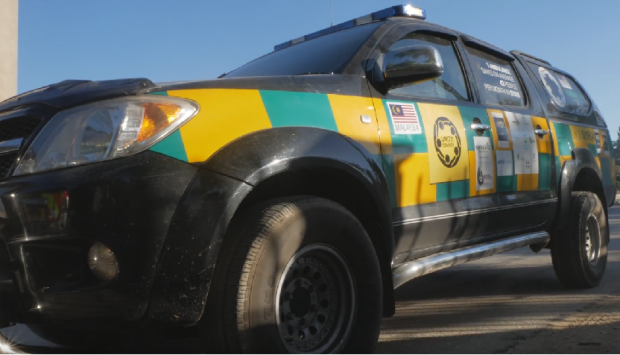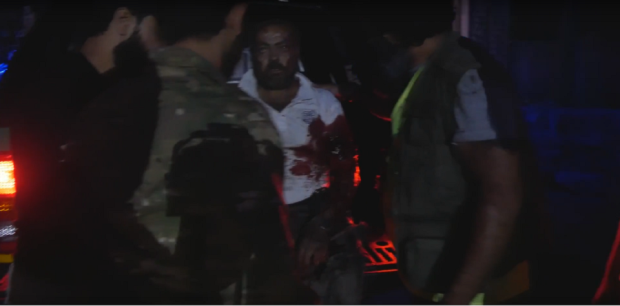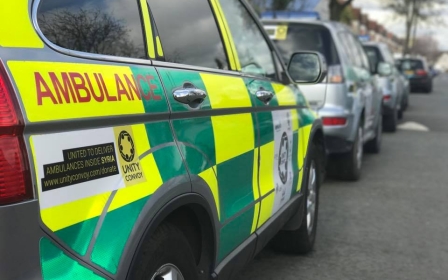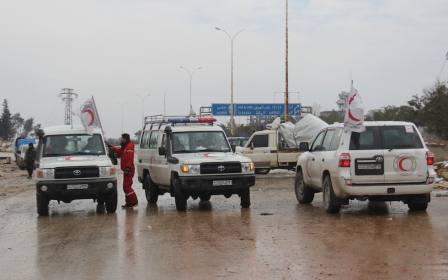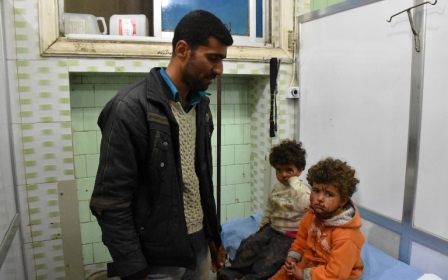British ambulance convoy called into action in Syria
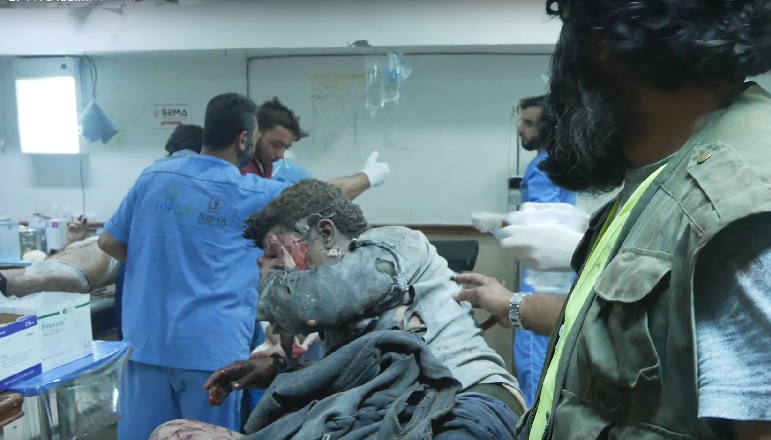
Ambulances donated by a British aid mission were called into action within a day of arriving in Syria, potentially saving lives in their response to a deadly explosion in the city of Idlib.
Vehicles donated by the Unity Convoy - a donation of 100 decommissioned ambulances and supplies - were called into action in the rebel-held Syrian town last Tuesday.
The explosion rocked a marketplace in Idlib city, killing three people and injuring several others. No one has claimed the attack.
In footage seen by MEE, an ambulance driver takes a wounded patient to a hospital.
"We just picked up three injured people at the moment we're just taking them on route to hospital now," said the driver, British aid worker Mohammed Shakiel Shabir.
As he arrived at the hospital a stretcher pulls up to the boot of the ambulance where the patient is.
Another victim follows but this time the blast has shredded his clothes beyond recognition and he lies crumpled on one side.
Dr Moustafa Manaam from Idlib Health Directorate, said: "As soon as we received the Unity Convoy ambulances, we heard an explosion nearby.
"The ambulance response team immediately set off to the area of the incident.
"As we arrived on the scene, we realised a suicide bomb explosion had just gone off in the market. There were a total of six casualties. As the casualties were being brought into the hospital, it was clear that three people were confirmed dead."
Alim Shamas - a spokesperson for the Unity Convoy, said: "The British public can be proud of their contribution to the humanitarian effort in Syria over the past years. This is yet another example of that contribution."
The Unity Convoy arrived in Bulgaria in April after setting off from Britain. From there the convoy was handed over to partners to carry through Turkey and into Syria.
Unity Convoy has worked closely with the health authorities in the wider region of Idlib, which has become the new fighting hotspot between rebels and the government since Aleppo fell earlier this year.
The Unity convoy was conceived earlier this year after Syrian and Russian government air strikes targeted a number of large hospitals in East Aleppo leading to a global outcry.
Members of the charity coalition said they lost 100 ambulances in the fight for Aleppo which led to increased deaths after victims were forced to use improvised transport to hospitals.
Jilu Miah, managing director of Human Aid UK, one of the charities that make up Unity Convoy, said Idlib could suffer a similar fate to Aleppo.
“The next one is going to be Idlib.” he said. "We’re worried about our hospitals being targeted, but we know it's a war."
According to figures collected by Physicians for Human Rights, as of May 2017 there had been 454 attacks on medical facilities across Syria since the war began in 2011, leaving 796 medical personnel dead. Ninety percent of the attacks, it said, were carried out by Syrian government forces and their Russian allies.
The charities involved have strong links to British Muslims, and include Anaya Aid and Hand in Hand for Syria, as well as Malaysian partner Lifeline for Syria.
In just three months of campaigning the charities involved were able to raise £500,000 through fundraising events including sponsored mountain climbs, school no-uniform days and football tournaments.
The British public can be proud of their contribution to the the humanitarian effort in Syria
- Alim Shams, Unity Convoy
A spokesperson for Unity convoy, Alim Shams, said: "The British public can be proud of their contribution to the humanitarian effort in Syria over the past years.
"This is yet another example of that contribution.”
British convoy volunteers told MEE in April that they had been "harassed" after police visited their homes and warned them to not go into Syria, even though they were only going as far as Bulgaria.
Some volunteers also complained that they had been held for hours under airport stop-and-search powers under Schedule 7 of the UK's Terrorism Act.
The UK's Charity Commission regulator has in the past persuaded UK charities against sending convoys to Syria over fears they could be used for non-charitable purposes.
It told MEE in April that “it does not support the use of aid convoys as an effective or safe way to deliver aid.”
But when asked if the coalition had plans for another convoy, Miah, the managing director of Human Aid, said: "Definitely plans for another convoy - this is urgent."
New MEE newsletter: Jerusalem Dispatch
Sign up to get the latest insights and analysis on Israel-Palestine, alongside Turkey Unpacked and other MEE newsletters
Middle East Eye delivers independent and unrivalled coverage and analysis of the Middle East, North Africa and beyond. To learn more about republishing this content and the associated fees, please fill out this form. More about MEE can be found here.


